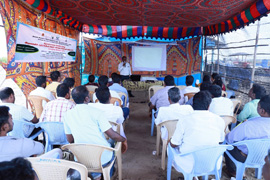Nagapattinam, 19 August 2016.
 With the motive to sensitize the shrimp farmers on emerging disease problems and to imbibe scientific know-how on strategies for controlling diseases in the forthcoming culture cycle by adopting better management practices (BMPs), Aquatic Animal Health and Environment Division of the Central Institute of Brackishwater Aquaculture organized ‘Aquaculture health camp’ for shrimp farmers at Chinnathumbur village in Tamil Nadu under the National Surveillance Programme for Aquatic Animal Diseases (NSPAAD).
With the motive to sensitize the shrimp farmers on emerging disease problems and to imbibe scientific know-how on strategies for controlling diseases in the forthcoming culture cycle by adopting better management practices (BMPs), Aquatic Animal Health and Environment Division of the Central Institute of Brackishwater Aquaculture organized ‘Aquaculture health camp’ for shrimp farmers at Chinnathumbur village in Tamil Nadu under the National Surveillance Programme for Aquatic Animal Diseases (NSPAAD).
The unique feature of ‘Aquaculture health camp’ was on-site testing of shrimp samples for important diseases such as white spot disease (WSD) and Enterocytozoon hepatopenaei (EHP) using PCR-DNA test at free of cost. The farmers were also offered pond-soil and water testing for as many as 12 parameters such as redox potential, pH, salinity, alkalinity, hardness, etc., including the bacterial load, which indicate the health of the aquaculture pond ecosystem. A consolidated report on the health of shrimp, health of pond ecosystem and remedial measures required were given to all participant farmers free of cost. The shrimp farmers of Chinnathumbur village had a day long interactions with the scientists on different facets of aquaculture, especially on the management of emerging shrimp health problems caused by EHP and white faeces syndrome. The farmers were also provided with information on acute hepato-pancreatic necrotic syndrome (AHPND), a disease that has caused enormous production loss to aquafarmers in the Southeast Asian countries. Since white spot disease remains the most important disease of farmed shrimp, use of biosecurity measures and better management practices was stressed to manage this devastating disease. The scientists impressed upon the farmers on the importance of soil and water quality management in shrimp aquaculture since environment is of paramount importance in the productivity of aquaculture operation.’Antibiotic residues in farmed shrimp’ is an important issue in aquaculture, as importing countries such as United States and those in the European Union require compliance to high quality standards. Shrimp farmers were sensitized on this issue and stressed on “no use of antibiotic and rational use of aquaculture inputs” in farming operations. The shrimp farmers were provided with a set of pamphlets written in Tamil on these topics for creating awareness among farming communities.
Fifty five local farmers, officials from Department of Fisheries (Government of Tamil Nadu), Regional Coordinator (NaCSA, MPEDA) also attended the programme.







फेसबुक पर लाइक करें
यूट्यूब पर सदस्यता लें
X पर फॉलो करना X
इंस्टाग्राम पर लाइक करें